Legacy Stories
Colin Meany
Colin Meany was a skilled ice hockey player from Matawan, New Jersey who was beloved and respected by his teammates and friends. He suffered two concussions in two weeks at the age of 15 and struggled with symptoms for the next two years of his life. Colin never complained about his symptoms and kept his battle with depression to himself. In August 2019, Colin died by suicide at the age of 17. His family wants everyone reading this story to learn about the seriousness of concussion symptoms and for athletes to realize they must wait until their concussion symptoms have fully recovered before they return to play. They want those struggling with depression from Post-Concussion Syndrome (PCS) to realize they are not alone, and there is hope and help available. Click here to make a donation in memory of Colin Meany to the CLF HelpLine, our service to support patients and families struggling with recovery from brain injury.
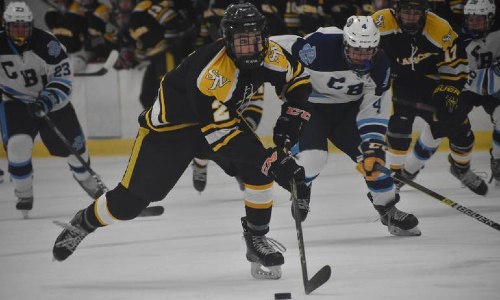
This article adheres to the Suicide Reporting Recommendations from the American Association of Suicidology.
Sometimes even warriors need to ask for help
On August 16, 2019, Colin Meany, known as “Patches” to family and close friends, took his own life at the young age of 17 after a two-year battle with significant post-concussion symptoms. It wasn’t until after his tragic death that his family and friends learned the extent of the pain he had been suffering in silence.
Colin was a very popular teenager just a week away from starting his hockey career at the University of Scranton. News of his suicide rocked the Jersey Shore community. Within hours of his death, hundreds of people gathered at a candlelight vigil near his home. Overwhelming emotions of inconsolable grief and shock filled the community. How could Colin Meany, a confident, outgoing student athlete, who always seemed so happy, decide to end a life that seemed so amazing? His own closest friends, who were with him just hours before he died, could not believe what had happened. Later, they began to realize how Colin’s life was deeply impacted by his concussions.
Even the veteran Major Crimes Detectives and other police officers who responded to the Meany home were affected by Colin’s death and discussed how “this one just doesn’t make any sense.”
In a clear and well-thought-out letter to his family and friends, Colin expressed his frustration with his post-concussion symptoms and pain that he fought silently as an athlete. He wrote about his fight with depression and anger for the two years since his concussions. He believed no doctor or medication could help him. He kept those feelings to himself, so others weren’t able to help him find resources for his pain.
Unfortunately, just like so many other athletes, he never fully understood that his painful daily struggles were not uncommon for someone healing from his injuries. Research has shown a link between concussion and suicide risk, with one study finding those who suffer a concussion are twice as likely to take their own lives.
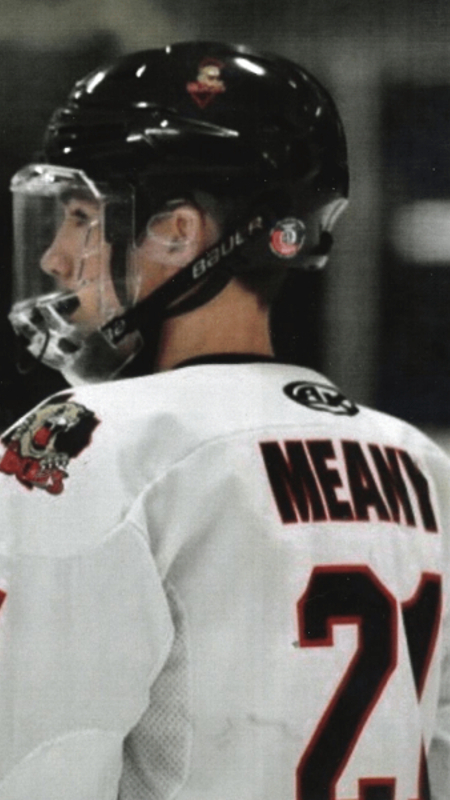
The first concussion
Almost exactly two years earlier, on Labor Day Weekend of 2017, 15-year-old Colin suffered a concussion while playing in a junior hockey game for the Jersey Shore Whalers. Immediately upon speaking with Colin, his father Mike says he knew Colin sustained a significant concussion. During the car ride home Colin told his father it felt like his brain was shaking in his head and he appeared as if he were intoxicated. Without delay, Colin’s parents brought him to a concussion specialist affiliated with a well-known and respected medical center.
During his initial assessment, Colin revealed he sustained what is now believed to be a previous concussion during a game just two weeks before this more severe concussion. When asked by his father why he hadn’t said anything about the prior injury, Colin replied, “I just wanted to keep playing and I knew if I said something I wouldn’t be able to play.”
Approximately three weeks later Colin expressed to his father for the first time in his life thoughts of depression. He texted saying, “This is driving me crazy. I can’t fall asleep, I’m depressed over nothing and it’s just making me mad.”
Colin continued to see the concussion specialist and was medically cleared to return to the ice, which is all he wanted. He once told his older brother Jack he felt his best when he was out on the ice.
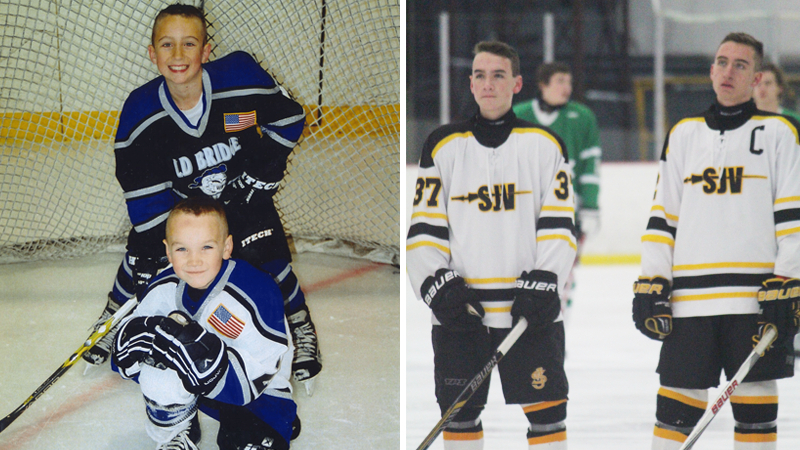
Colin returned to play the sport he was so passionate about. He had been playing ice hockey since he was five years old when he started with the Old Bridge Junior Knights. After finally being cleared to play again, he returned to play for the Jersey Shore Whalers and continued to play with his teammates and friends on both the Jersey Shore Wildcats and his high school team at Saint John Vianney High School.
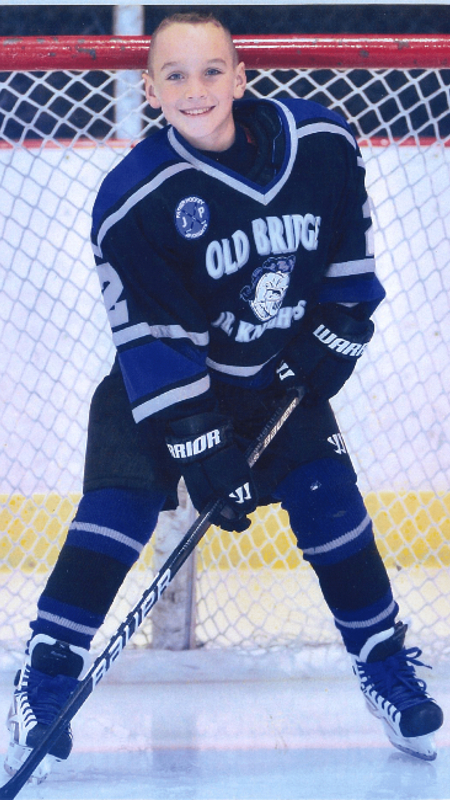
During that time, Colin’s headaches and inability to sleep continued. His parents brought him to a highly respected neurologist who was known for helping patients, including military combat veterans, with post-concussion symptoms. Colin was prescribed medications for the severe headaches.
By all accounts the brief period of depression had been resolved. When repeatedly asked by his parents and during numerous subsequent doctor visits, Colin always denied having any symptoms of depression. None of his family, many friends, teammates, or coaches would have described Colin as depressed or potentially suicidal.
After his death however, Colin’s friends described that after his concussions, Colin would continuously fall asleep in class and would often leave loud parties early (Colin never wanted to miss a party). He would also sometimes want to leave the beach due to the bright sunlight that would cause him to have severe headaches. But he never complained or asked for help.
According to the National Institute of Mental Health, suicide is a complex public health concern, and there is no single cause. Suicide is often preventable and most often occurs when stressors and health issues converge to create an experience of hopelessness and despair.
After Colin’s death, his parents also learned he was texting himself sports-related motivational reminders. It became apparent he knew he needed help but tried to cope on his own.
The hockey community comes together
Suicide impacts communities in profound ways. The outpouring of love and support from the hockey community after Colin’s death was a true testament to his character. More than 1,000 people including so many young men wearing their hockey team jerseys attended the funeral services for their beloved teammate. The young men all described Colin as a tough, gritty, and loyal teammate who always had their back on the ice and made them laugh on bus rides and in the locker room. Even members of rival teams paid their respects and described Colin as a well-respected opponent.
In such a sad and obvious way, the faces of the young people, just like the faces of so many others who attended Colin’s services, were the same. They all showed overwhelming emotions of grief, fear, and confusion. Once again so many people attending the services said, “this just doesn’t make any sense.” Colin kept his struggles to himself.
“Colin was a tremendous teammate and always played with high energy and tenacity,” said Hugh Donoghue, one of Colin’s youth hockey coaches. “Colin was a skilled goal scorer and always found the back of the net when our team needed it the most. I will forever remember his smile and enthusiasm. We were down a goal or two in a game and he said to me don’t worry coach, we got this. True to form he tied the game up and assisted on the winning goal. Colin was beloved and respected by his teammates and coaches.”
Mick Messemer, the current and long-time head ice hockey coach at Saint John Vianney High School who coached Colin for years, described Colin as “one of the best teammates to ever put on a Lancer uniform, regardless of sport.”
“Colin’s love for his school, program, and teammates both on and off the ice will live on forever,” Messemer said.
He also noted that Colin’s work ethic to be the best player he could be was well respected by the locker room and coaching staff.
Even a long-time Jersey Shore hockey referee felt compelled to talk about Colin. Paul Murray described how he spent many hours on the ice with Colin as a referee.
“I enjoyed them all and had so many conversations in between whistles and face offs,” Murray said. “He was genuine, he was funny, he was tough. He was a great kid on the ice, and I enjoyed every interaction with him.”
The Meany family continued to see an outpouring of love and support.
On October 27, 2019, the University of Scranton Ice Hockey Team played the New Jersey Institute of Technology in a Colin Meany Charity game. At the game, Colin’s parents Mike and Karen Meany and his older brother Jack were presented with the #2 Scranton Royals Jersey.
On November 20, 2019, the New Jersey State Policemen’s Benevolent Association Hockey Team played the Saint John Vianney Alumni Hockey Team in the First Annual Colin Meany Memorial Hockey Game. The game was organized by Dan Tacopino, captain of the PBA team who also coached Colin at Saint John Vianney.
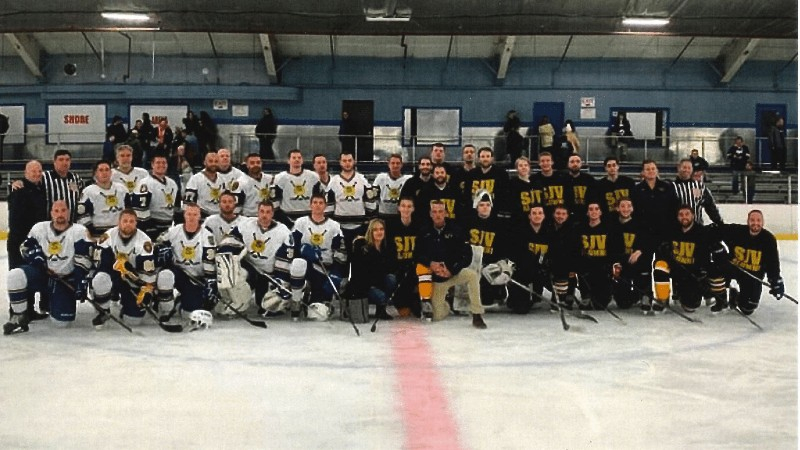
There were more than 600 people in attendance to watch the emotional pregame puck drop ceremony when Colin’s father dropped the puck with the PBA Team captain facing off against Jack Meany.
“Colin Meany is one of those kids that you would want on your team,” Coach Tacopino said. “Every sprint he would want to be the fastest, every drill he would want to come out on top, every shift he would want to score or make a big play, and every game he would want to win. Concussion is a serious topic that cannot be overlooked. The fact that Colin put his health aside to assure the team would be successful will show you his dedication and unselfishness he had toward the game he loved. We as coaches, parents, spectators and friends need to assure the health of our athletes. We know a lot of kids who are competitive in their sport and are willing to keep going after an injury. The brain is not a muscle that can recover like a torn tendon or a bruised muscle. You cannot put a cast on your brain or do a certain exercise to rejuvenate it. The brain is a delicate part of the body that needs to be taken more seriously. Colin was a tough athlete and showed no injury. The only time he showed it was when he took his own life. Missing a practice, missing a shift, missing a game can be the difference to a life altering decision. I was Colin’s coach for four years and he always wanted to be the best to ensure his team would be successful. Colin was the true meaning of grit, strength, toughness and heart.”
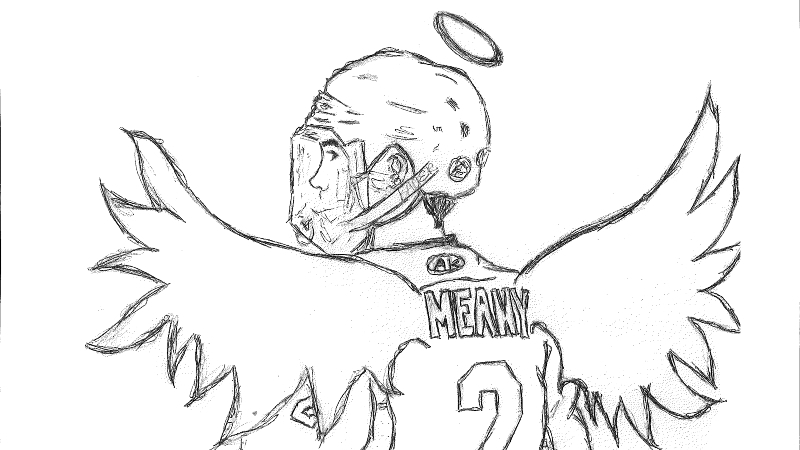
“Meany was a true warrior,” Jersey Shore sports reporter John Christian Hageny wrote about Colin after the memorial game. “A tough, hard-nosed forward who left it all out on the ice… Injured shoulder in final of the Shore Conference Handchen Cup but kept playing for his SJV team… was a real pleasure covering this young man, rest easy Colin.”
The Meany family wants to thank everyone for their love and support since Colin’s passing. They hope no family has to feel their same unthinkable sorrow. They are pleading to those who are courageously and unselfishly fighting through this battle to speak up about their pain. Mike, Karen, Jack, and Colin’s friends, teammates, and coaches have raised tremendous support for CLF to help prevent future tragedies like Colin’s. We are honored by their generosity after incredible heartbreak and vow to continue to raise awareness, support patients and families, educate the public, and advance research in Colin’s honor. To make a gift to the Concussion Legacy Foundation in Colin’s memory, click here.
Are you or someone you know struggling with lingering concussion symptoms? We support patients and families through the CLF HelpLine, providing personalized help to those struggling with the outcomes of brain injury. Submit your request today and a dedicated member of the Concussion Legacy Foundation team will be happy to assist you.
Suicide is preventable and help is available. If you are concerned that someone in your life may be suicidal, the five #BeThe1To steps are simple actions anyone can take to help someone in crisis. If you are struggling to cope and would like some emotional support, call the National Suicide Prevention Lifeline at 1-800-273-8255 to connect with a trained counselor. It’s free, confidential, and available to everyone in the United States. You do not have to be suicidal to call. If you’re not comfortable talking on the phone, consider using the Lifeline Crisis Chat.
In August 2021, Colin's friends honored him
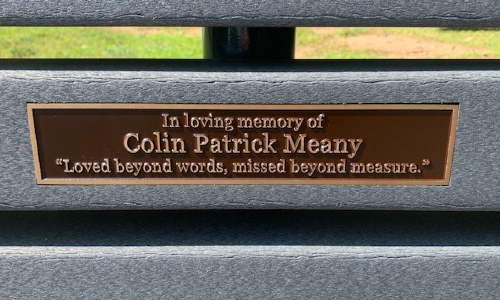
On Sunday, August 8, 2021, many of Colin’s friends and teammates gathered at a basketball court near Colin’s home for a dedication ceremony for a memorial bench in Colin’s name. The basketball court is a place where Colin would often go to work on his agility skills, always striving to be the best hockey player and teammate that he could be.
Suicide Prevention Resources

Nobody should have to go through a crisis alone. Dial 9-8-8 if you or a loved one is in crisis or suicidal.
Suicide Prevention Lifeline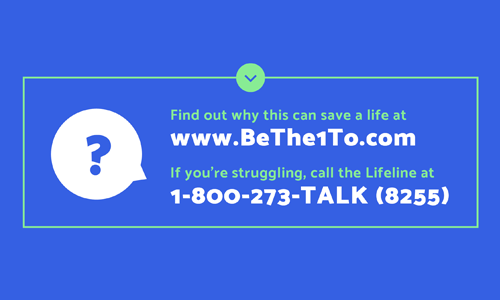
We can all play a role in preventing suicide. Learn the five steps to help you #BeThe1To support someone in crisis.
#BeThe1To Resources